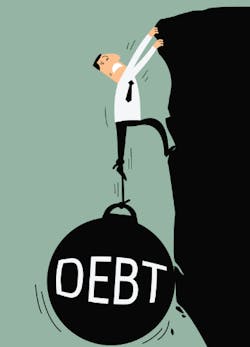After consulting with graduates who collectively owe more than $100 million in dental school debt, I notice some recurring patterns. While you can easily take a bunch of different paths that feel good, you need to develop a clear plan and discard the tactics that only serve to keep you in debt longer due to making inefficient payments.
____________________________________________
Here are my top seven tips for paying off dental school debt.
1. Move to a location that needs dentists.
Every time I meet a dental practice owner who’s struggling, he or she usually lives in a place like northern New Jersey, New York, northern or southern California, or Utah. If you move to a location that’s saturated with dentists, your income will have a much lower ceiling.
This income limitation gives you less ammunition to use when attacking your student debt. I’ve seen dentists with $300,000 to $400,000 in student debt pay it all back in fewer than three years. But all of them took advantage of making a lot of money in places with less competition and low living expenses.
2. Use REPAYE, PAYE, or student loan refinancing.
There are many options for debtors to consider that do not involve the Revised Pay As You Earn program (REPAYE), Pay As You Earn program (PAYE), or private refinancing to tackle their dental school debt. Almost all of them lead to costly mistakes. You should stick with these three.
The first two are good if you owe more than two times your adjusted gross income (AGI) and expect to for most of your career. Refinancing is good if you already owe less than two times your AGI because it allows you to lower your interest rate.
3. Shop around multiple lenders for a good interest rate.
If you do decide to refinance, don’t just shop at the only name you know about or go with a company because they’re endorsed by a certain professional organization. Shop around and make sure the deal you’re getting is competitive.
Many lenders recently updated their underwriting models to help dentists get far more competitive offerings. You should also try and get a cash-back bonus for refinancing your loans. If you owe more than $400,000, you might be able to create a food fight between lenders for your business. Rate wars are good, especially when they involve lowering your interest cost. If you respond to a direct mailer you receive, that’s not necessarily going to be the case.
4. Owning your dental practice will get you out of this debt.
No matter if you’re planning to do a loan forgiveness strategy or refinancing, owning a practice is the way to go as opposed to being an associate. Do you need to make a lot of income to cover monthly payments of $3,000 or more? Owning a practice is going to give you the opportunity for a high income, more so than being an associate.
Are you looking for tax shelters to reduce your AGI and receive lower loan payments so you can benefit from dental school debt forgiveness? Most of the tax code is written to give employers the advantage instead of employees. You have a better chance at reducing your AGI by being an owner as opposed to an associate paid with a W-2.
5. Don’t overvalue student loan repayment benefits.
Whether you’re looking at a student loan repayment benefit with the Indian Health Service, NHSC, or a big corporate DSO group, make sure you critically evaluate it. While it’s obviously better to get loan repayment benefits than not, in reality, there’s a tradeoff. If you’re working for somebody else and getting a repayment benefit, you’re not building equity in your dental practice.
Decide what will make you the most well off financially. It could very well be forgoing loan repayment benefits and making more money while running your own show.
6. You will probably not get the public service loan forgiveness program.
Of the more than 300 dentists and dental specialists I’ve developed student loan plans for, only a few are on track for the public service loan forgiveness program (PSLF), which allows you to pay back your loans for 10 years and get the remainder forgiven tax-free.
The reason for this? Most community health centers and other nonprofit employers in dentistry require high volume procedures since they typically deal with a low-income high-need population. Many dentists have told me that these jobs are great for building clinical speed and giving back for a couple years. However, most of them burn out after a relatively short time because the job wears on them physically. I would not personally plan on PSLF based on the stats I’ve seen for clients who have pursued it successfully.
7. Avoid big housing and car expenses.
It’s tempting to sign up for a car lease or monthly payment. You may also feel pressured, whether it’s from society, your spouse, or yourself, to buy a big house after years of sacrifice. I suggest limiting your mortgage to two times your joint income. A car should be paid for in cash until you can justify expensing one through your practice and making it tax deductible.
Even then, you should be maxing retirement accounts and have your student loans figured out long before you commit to big fixed expenses that do little to grow your net worth, unlike the positive wealth effect from owning a practice.
Develop a plan to pay off your dental school loans
Whether you navigate dental school loans or get a personalized student loan repayment plan from a company like mine, know that when you owe as much debt as it takes to get a dental degree these days, it’s easy to make a lot of costly mistakes. Following these seven tips can be the best way to pay off dental school loans fast.
Refinance if you owe less than two times your income, or set yourself up on PAYE or REPAYE and maximize your wealth while minimizing your taxes. You work too hard to waste tens of thousands of dollars with a suboptimal repayment strategy!







